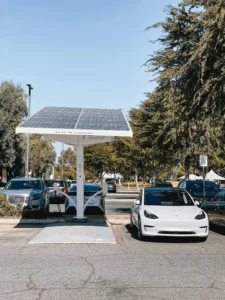The world is facing increasing challenges due to climate change, pollution, and overreliance on fossil fuels. Every year, millions of tons of greenhouse gases are released into the atmosphere, contributing to global warming and environmental degradation. To combat these issues, more individuals, businesses, and governments are turning to renewable energy sources like solar energy.
Solar power is one of the cleanest and most abundant sources of energy on the planet. By installing solar panels, you not only save money on electricity but also contribute to protecting the environment. In this article, we’ll explore the environmental benefits of solar energy, focusing on how it helps reduce your carbon footprint and supports a sustainable future.
1. Reduces Greenhouse Gas Emissions
The most significant environmental benefit of solar energy is its ability to reduce greenhouse gas emissions. Traditional electricity generation relies heavily on fossil fuels such as coal, oil, and natural gas. Burning these fuels releases carbon dioxide (CO2), methane (CH4), and nitrous oxide (N2O), all of which are harmful greenhouse gases.
How solar helps:
- Solar panels generate clean electricity directly from sunlight.
- No harmful emissions are released during operation.
- Over its lifetime, a residential solar system can offset tens of thousands of pounds of CO2 emissions.
This reduction in carbon emissions plays a crucial role in slowing down climate change and improving air quality.
2. Decreases Air Pollution
Fossil fuel power plants don’t just release greenhouse gases; they also emit air pollutants such as sulfur dioxide, nitrogen oxides, and particulate matter. These pollutants are linked to respiratory illnesses, heart disease, and premature deaths.
By contrast, solar power systems generate electricity without producing air pollutants. A wider adoption of solar energy leads to cleaner air, which benefits public health and reduces medical costs associated with pollution-related illnesses.
3. Conserves Natural Resources
Coal mining, oil drilling, and natural gas extraction require significant environmental disruption. These processes not only deplete finite natural resources but also damage ecosystems, contaminate water supplies, and destroy wildlife habitats.
Solar energy, on the other hand, is renewable and virtually limitless. The sun provides more energy in one hour than humanity consumes in an entire year. By harnessing this abundant resource, we reduce our dependence on nonrenewable fuels and protect fragile ecosystems.
4. Reduces Water Usage
Many traditional power plants, especially those that burn fossil fuels or use nuclear technology, require massive amounts of water for cooling and steam generation. This puts pressure on water supplies, especially in arid regions.
Solar photovoltaic (PV) panels, however, require little to no water to generate electricity. By switching to solar, you help conserve water resources, making it especially valuable in regions prone to droughts or water shortages.
5. Promotes Energy Independence
While this is often considered an economic benefit, it also has environmental implications. By generating electricity locally through solar panels, communities reduce their reliance on imported fossil fuels. This lowers the environmental impact associated with drilling, transporting, and burning fuels.
Energy independence also reduces the risk of oil spills, gas leaks, and other ecological disasters that harm the environment.
6. Supports Biodiversity
Mining and drilling often destroy habitats and displace wildlife. Fossil fuel extraction is linked to deforestation, soil erosion, and water contamination, which negatively affect biodiversity.
In contrast, solar energy systems can be installed on rooftops, parking structures, and already-developed land, minimizing their impact on ecosystems. By choosing solar, you help preserve forests, wetlands, and other critical habitats for wildlife.
7. Encourages Sustainable Development
Solar energy is a cornerstone of sustainable development. It aligns with global environmental goals such as the United Nations Sustainable Development Goals (SDGs), specifically:
- Affordable and Clean Energy (SDG 7): Expanding access to renewable energy.
- Climate Action (SDG 13): Reducing carbon emissions.
- Life on Land (SDG 15): Protecting ecosystems.
By adopting solar power, individuals and businesses contribute to a more sustainable, balanced, and environmentally friendly society.
8. Reduces Noise Pollution
Fossil fuel plants, along with backup generators, often produce noise pollution that disrupts communities and wildlife. Solar panels, however, are silent. This makes solar an ideal energy solution for residential areas, schools, and hospitals, where quiet environments are essential.
9. Helps Combat Climate Change
Solar energy directly addresses one of the biggest environmental threats of our time: climate change. By reducing carbon emissions and minimizing reliance on fossil fuels, solar energy slows the pace of global warming.
Every solar panel installed contributes to a collective effort to prevent rising sea levels, extreme weather events, and ecosystem collapse. Choosing solar is one of the most impactful ways individuals can take climate action.
10. Inspires a Green Future
Beyond its immediate benefits, solar energy inspires innovation and adoption of other sustainable practices. As more people invest in solar, the demand for cleaner technologies grows. This shift encourages governments and businesses to develop greener solutions, creating a ripple effect that leads to a healthier planet.
Conclusion
The environmental benefits of solar energy are undeniable. From reducing greenhouse gas emissions and conserving water to supporting biodiversity and combating climate change, solar power offers a sustainable path forward. By investing in solar panels, you not only reduce your carbon footprint but also contribute to a cleaner, healthier world for future generations.
As the demand for clean energy grows, solar energy continues to stand out as one of the most effective ways to protect our environment. Making the switch to solar is more than a financial investment — it’s a commitment to the planet.

